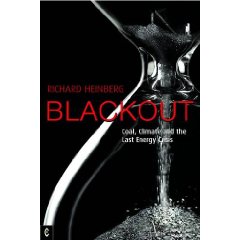 Coal. Under the surface we seem to have a lot of it. It’s fairly inexpensive but this is changing as demand rises to meet increased energy needs especially in countries like China. So we have a lot, its cheap, let’s use it, what’s the problem? Right? Wrong!
Coal. Under the surface we seem to have a lot of it. It’s fairly inexpensive but this is changing as demand rises to meet increased energy needs especially in countries like China. So we have a lot, its cheap, let’s use it, what’s the problem? Right? Wrong!
Author Richard Heinberg writes in Blackout: Coal, Climate and the Last Energy Crisis, “In short: two of the defining trends of the emerging century–the development of the Asian economies and climate change–both center on coal. But coal is finite non-renewable resource. Thus, a discussion of the future of coal must also intersect with a third great trend of the new century: resource depletion.”
In the first part of the book, Heinberg takes the reader through a deep analysis of just how much coal is available throughout the world. Keep in mind, forecasts assume that current energy use stays the same, but it is increasing each year, making coal available for a shorter amount of time. Best estimates are that the world will see Peak Coal by 2025 and many believe that the world has already witnessed Peak Oil.
Now, you’re just waiting for me to say there is no such thing as clean coal. So there, it’s out in the open. In the second section of the book, Heinberg talks about the link between coal and greenhouse gas emissions and discusses the technologies to create “clean coal”. They are all challenged to say the least.
At the end of Blackout, Heinberg details three scenarios that involve coal, climate and energy. They are all very disturbing, but Heinberg has a way of tackling issues head on.
“For strategic purposes, it is important to understand our human tendency to discount future problems. We must assess which threats will come soonest, and make sure that out sometimes frantic efforts to respond to these immediate necessities do not exacerbate problems that will show up later. Peak Oil is clearly the most immediate energy and resource supply threat the policy makers must deal with….”
He continues, “If energy scarcity forces policy changes before climate fears can do so, then perhaps world leaders will find that it makes more sense to ration fuel themselves, rather than the emissions they produce.”
 Heinberg continues by warning if we don’t get a grip on the real amount of fossil fuels supplies we have left as well as a deeper understanding of the environmental and economic consequences of burning fossil fuels..hello Blackout.
Heinberg continues by warning if we don’t get a grip on the real amount of fossil fuels supplies we have left as well as a deeper understanding of the environmental and economic consequences of burning fossil fuels..hello Blackout.
Wow, conservation…what a novel concept…good thing the fuel economy standards (aka CAFE standards) were finally improved.
“…Otherwise, the policies pursued are likely to be ineffective, counterproductive, and inconsistent.” Can you say proposed Climate Bill?
I’m a huge fan of Heinberg and he doesn’t disappoint with Blackout. You can buy this book or any book I review by clicking here.
BTW – Richard Heinberg is going to be a guest on the premier of national radio program Pure Energy, hosted by Sean O’Hanlon. The show debuts on July 13, 2009 at 6:00 p.m. EST on 880 The Biz and can also be heard live on www.PureEnergyShow.com.

